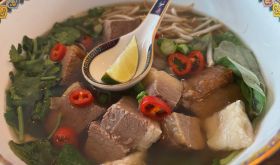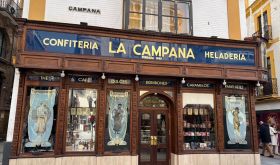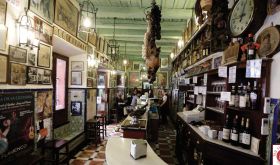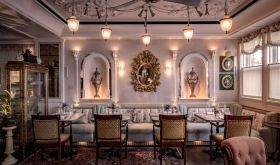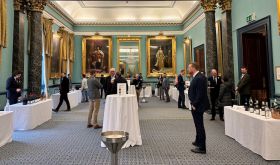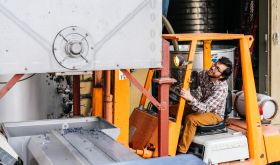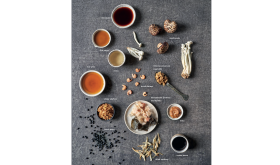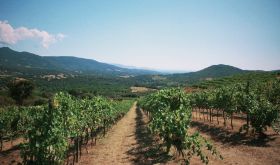See below for list of some other pubs in the English countryside with distinctly superior food.
The car park of the The Helyar Arms in East Coker, three miles from Yeovil Junction, Somerset, separates two quintessentially English buildings.
On the right, what was originally built about 400 years ago as an apple store today houses an authentic wooden skittle alley to which successive teams of men repair to compete with their pint glasses.
On the left, dating back to 1456, is the pub with five far more modern bedrooms. Its interior is so idyllic it could have been especially constructed for a Hollywood set.
Neither the floor nor the ceiling seem level, and there are wooden beams everywhere. To the left is an open log fire and a piano which customers start playing, some better than others, when the mood or the alcohol takes them. The ceiling is covered in horse brasses, copper pots and pans and old-fashioned farming implements while most of the pictures relate to the countryside. One, right opposite the entrance, portrays the dénoument of a foxhunt and is simply called 'Death'.
The final touch is provided by perhaps Britain's most mannered barman, Charles. Ex-Dragoon Guards and a stockbroker by day, Charles works here most nights because he loves the atmosphere. A ramrod-straight back, a blue-and-white spotted handkerchief and a pipe which he leaves smouldering on the side when the bar gets busy, are aspects not even the most assiduous film director would think of.
Behind the bar, which serves the ubiquitous beers as well as the local Flowers bitter and Taunton traditional cider, is the equally ubiquitous and eminently sensible sign 'Think before you drink'. But next to this are two more distinctive signs which announce that today's beef comes from Mr Durston's herd of ruby red cattle in Glastonbury and the free range pork from nearby Chard. Eight months ago the 550-year-old Helyar Arms took its first steps to becoming a gastro-pub.
This is an apparently illogical career step for Australian Ian McKerracher who has been a restaurant manager for some of the best chefs in Sydney and London, a restaurant guide inspector and, most recently, chief executive of the Restaurant Association, the British restaurateurs' trade body. A joint decision to bring their young family up outside London brought the McKerrachers to East Coker and the warmth of the subsequent welcome persuaded them to take the pub on.
'We moved here from Winchester a year ago and we had packed all our worldy possessions into two large removal vans,' McKerracher explained, his face turning increasingly pale. 'but a freak fire destroyed both vans overnight and we lost everything we owned. We arrived here with nothing.'
His expression changes as he describes the village's reaction. 'It was extraordinary. Every morning we would wake up and there would be a carrier bag on the door handle with toys and clothes for the boys. Eggs and cakes would be left by the back door. Everything we now so cynically suspect does not exist in rural England seems to be here.'
This decision involved breaking the major professional promise they had made to each other never to employ staff again and eight months later to Ian's late night confession that, 'Hand on heart this is the hardest thing I have ever done. I have to combine the roles of hotelier, restaurateur and publican but without their margins.'
This was all the more heartfelt as it was made at 22.00 when McKerracher finally appeared from the kitchens in his whites. The two young Australian chefs who had set the pub on the food route he had mapped out and were supposed to stay until late January had succumbed in early November to the lure of the beaches of Thailand and he would be in the kitchen until their replacement arrives in mid-December.
By that stage I and 60 others had eaten extremely well. My dinner – warm marinated herrings, Lancashire hotpot and the local, first-class Montgomery Cheddar along with several glasses of Flowers – signified a huge leap in quality from what had been on offer when McKerracher took over in April when the pub's deep freeze had been so well stocked that it took two months to clear.
'In a way upgrading the menu and reorganising the kitchen has been relatively easy compared to the negotiations beforehand with the landlords. This is a tied house like the vast majority of British pubs and I have taken over the remainder of the lease from the previous tenant. That means that every fortnight four items, the rent, the continuing fee, the insurance rent and the decorating fund, are taken by direct debit out of our account. These items may represent up to 20 per cent of the pub's turnover although we have managed to lower that as turnover has risen from two to four thousand pounds a week to seven to eleven thousand.'
'But the most pernicious clause stipulated that in addition to buying beer and cider from the landlord, now a property company rather than a brewery, I had to buy 900 gallons of alcopops a year from the landlord and pay for them even if I did not sell them. That's the equivalent of £28,000. Fortunately, the landlord did give me a side letter to remove this obligation although technically it still remains in the lease.'
There is no doubt that food is bringing a vital economic underpinning to British pubs whose previous role was ruined by neglect and the timely introduction of the breathalyser. But McKerracher believes that there is still a long way to go.
'The food is so much better, there are great British beers and we, like many others, are free to go our own way with the wine list. But there are two structural problems. The first is that the relationship between the landlord and the publican seems to be mired in suspicion and mistrust. If new people are to be drawn in and the pubs renovated to reflect the huge improvement in the food and service, then the landlords and publicans have to work together rather than against one another.'
'I had appreciated all this when I opened,' McKerracher continued, 'but what has struck me so forcibly since then is the image problem we face. Like so many other pubs we buy the best, often organic, cook everything to order and employ waitresses to take orders. So in many respects we are a restaurant. But our customers still think of us as a pub and that means that there is not only a limit on what they will pay but also a time limit. For pretty similar dishes which are £15/17 on a restaurant menu we cannot charge more than £10/12 and anything that takes over 15 minutes to cook and serve presents a problem.'
At almost midnight, McKerracher got up to get some sleep before the breakfast shift (for which he offered the excellent tip of a small spoonful of creamed horsedradish in the scrambled egg mixture which gives the dish a real lift). Barman Charles was finishing his habitual supper of bread and cheese while the young sous chef was having a drink with his girlfriend, the pub's kitchen porter who, rather surprisingly, had represented England at karate in the Sydney Olympics.
As in so many restaurants and pubs across the country at this time of night, the chefs talked about how the service had gone, food costs and what needed to be prepared the following morning. When the talk turned to the presentation of the dishes McKerracher gave a piece of advice which the chefs in these distinctive country pubs must never lose sight of – keep it rustic.
The Helyar Arms
tel 01935 862332, web www.helyar-arms.co.uk
Some other country pubs with good food
The Greyhound, Stockbridge, Hampshire (tel 01264 810833)
The Swan at The Vineyard, Lamberhurst, Kent (tel 01892 890170)
The Ring O'Bells, Widcombe, Bath (tel 01225 448870)
The Jolly Frog, Leintwardine, Shropshire (tel 01547 540298)
The Lamb, Burford, Oxfordshire (tel 01993 823155)
The Woolpack, Slad, near Stroud (tel 01452 813429)
Punch Bowl Inn, Crosthwaite, Cumbria (tel 015395 68237)
The Angel, Hetton, N Yorkshire (tel 01756 730263)
The Moulin Inn, Pitlochry, Perthshire (tel 017964 72196)
The Ship Inn, Elie, Fife (tel 01333 330246)
Nant-y-Finn Cider Mill, Crickhowell (tel 01873 810775)
The Buck's Head Inn, Dundrum, Co Down (tel 028 4375 1868)

